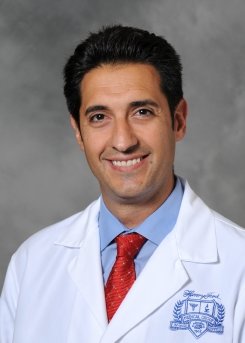Wayne State University Associate Professor of Physiology Pablo Ortiz, Ph.D., was selected by the American Heart Association’ Council on Hypertension to present the 2024 Lewis K. Dahl Memorial Lecture.

Dr Ortiz received his award and presented the lecture at the American Heart Association’s Hypertension Scientific Sessions, held Sept. 5 in Chicago.
“I spoke about the mechanisms of salt-sensitive hypertension, what is already known, and also new discoveries in my lab that support a complicated network of proteins that is dysregulated to increase NaCl transport in the kidney nephron,” he said.
One speaker is selected to present the annual lecture from a pool of candidates nominated by other scientists.
“I am incredibly honored to receive this award. I am humbled to join a list of eminent scholars in the field of hypertension research who have greatly contributed to our understanding of salt sensitive hypertension,” he said.
The endowed lecture was established in 1988 by the Council for High Blood Pressure Research, now known as the Council on Hypertension, in honor of Dr. Dahl’s pioneering work on the relation between salt, the kidney and hypertension, and for establishing a major genetically-based experimental model of hypertension.
Dr. Ortiz heads the Hypertension and Vascular Research Division at Henry Ford Health. He is also the scientific director of the Translational and Clinical Research Center at Henry Ford Hospital and the Earl Ward Chair of Hypertension. He has received funding from the National Institutes of Health and other agencies, including the American Heart Association, since 2006.
His area of research is broadly defined as the role of the kidneys in hypertension and cardiovascular disease. He has developed several molecular, biochemical and cell biology approaches to study the regulation of renal ion transport.
Dr. Ortiz’s lab recently integrated omics technologies and functional genomics to discover new molecular mechanisms of hypertension. His latest research includes studying the molecular mechanisms by which obesity, high dietary fructose or fat, in combination with a high-salt diet, affects renal NaCl handling to increase blood pressure and contribute to kidney diseases. He is one of the founding members of the Translational and Clinical Research Center at Henry Ford Hospital.